Roots Quest
Roots Quest
Inside Americas Genealogy Boom
Jackie Hogan
ROWMAN & LITTLEFIELD
Lanham Boulder New York London
Published by Rowman & Littlefield
An imprint of The Rowman & Littlefield Publishing Group, Inc.
4501 Forbes Boulevard, Suite 200, Lanham, Maryland 20706
www.rowman.com
6 Tinworth Street, London SE11 5AL, United Kingdom
Copyright 2019 by The Rowman & Littlefield Publishing Group, Inc.
Maps in chapter 3 from iStock.com/Vlok. Photos in chapter 8 taken by author in June 2013.
All rights reserved . No part of this book may be reproduced in any form or by any electronic or mechanical means, including information storage and retrieval systems, without written permission from the publisher, except by a reviewer who may quote passages in a review.
British Library Cataloguing in Publication Information Available
Library of Congress Cataloging-in-Publication Data
Names: Hogan, Jackie, 1967 author.
Title: Roots quest : inside Americas genealogy boom / Jackie Hogan.
Other titles: Understanding Americas genealogy boom
Description: Lanham, MD : Rowman & Littlefield, [2018] | Includes index.
Identifiers: LCCN 2018029090 (print) | LCCN 2018033861 (ebook) | ISBN 9781442274570 (ebook) | ISBN 9781442274563 (hardcover : alk. paper)
Subjects: LCSH: GenealogySocial aspectsUnited States. | GenealogyStudy and teachingUnited States. | United StatesGenealogyHistory21st century. | EthnicityUnited StatesHistory21st century. | Group identityUnited StatesHistory21st century. | National characteristics, American.
Classification: LCC CS9 (ebook) | LCC CS9 .H64 2018 (print) | DDC 920.00973dc23
LC record available at https://lccn.loc.gov/2018029090
 The paper used in this publication meets the minimum requirements of American National Standard for Information SciencesPermanence of Paper for Printed Library Materials, ANSI/NISO Z39.48-1992.
The paper used in this publication meets the minimum requirements of American National Standard for Information SciencesPermanence of Paper for Printed Library Materials, ANSI/NISO Z39.48-1992.
Printed in the United States of America
To Michael and Zoe,
and to the countless grandmothers and grandfathers who made you possible.
Acknowledgments
T here is nothing like genealogical research to make you aware of both your connections and your debts to others. I wish to thank the many genealogists, archivists, and roots industry professionals who have shared their thoughts and experiences with me over the past five years. Without them, this book would not have been possible. Thanks also to my friends and colleagues who have talked through many aspects of this work with me, particularly Naomi Stover, who provided valuable feedback on my discussion of genetic genealogy. Finally, I wish to thank a group of people who will never read this bookthe Czech midwife, the Irish tenant farmer, the Virginia cooper, the Nebraska homesteading mother of six, and all the countless ancestors in my family tree whose perseverance made my life and the lives of my children possible.
Roots Quests
An Introduction
In all of us there is a hunger, marrow-deep, to know our heritageto know who we are and where we have come from. Without this enriching knowledge, there is a hollow yearning. No matter what our attainments in life, there is still a vacuum, an emptiness, and the most disquieting loneliness.
Alex Haley, author of Roots
I n the basement of a cavernous convention center, a group of eager family historians crowds around one man. In the printed programs they carry, his name is adorned with letters of distinction: CG, FASG, FNGS, FUGA, codes well known to those waiting their turn to speak with him. He is a renowned liberator of ancestors, a professional genealogist, and they have come to unlock the secrets of their past.
If you ask them why they have traveled over wintry roads and paid hundreds of dollars to attend this genealogy conference, they will tell you they are looking for the name of a great-great-great-grandparent, the military service record or baptismal certificate of a distant forebear, a ships log with traces of an immigrant ancestor, or countless other crucial details to put flesh on the bones of their family histories. But delve a bit deeper and you find that they seek far more than names and dates, places and documents and stories. They seek a sense of belongingto family, to community, to nation, and to history.
America is in the midst of a genealogy boom. In 1977, just 29 percent of Americans polled said they were very interested in family history. By 1995, that had grown to 45 percent. By 2000, it had jumped to 60 percent; by 2005, to 73 percent; and by 2009, to a remarkable 87 percent. Online genealogy sites have rapidly proliferated in the last decade. The leading subscription service, Ancestry.com, went from being a small genealogical research and publishing firm in the 1990s, to a NASDAQ-listed corporation with 2.6 million subscribers and $850 million in annual revenues. Likewise, the preeminent family history research venue in the United States, the Family History Library in Salt Lake City, hosts in excess of seven hundred thousand visitors each year, and another prominent genealogical library, the Allen County Public Library in Fort Wayne, Indiana, sees more than four hundred thousand genealogists each year. Countless Americans are venturing even further afield in their ancestral quests, with a thriving roots tourism industry expanding to cater to their desire to connect with Old Country destinations. Ireland alone hosts almost one million international roots tourists annually (a remarkable figure, given its population of under five million). Amid this bourgeoning interest in ancestry, and no doubt helping to fuel such enthusiasm, several television broadcasters have brought family history series to air, including, most notably, PBSs Faces of America (2010), Finding Your Roots (201217), and Genealogy Roadshow (201316), and NBCs (now TLCs) Who Do You Think You Are? (201018).
Many observers have commented on the upsurge of interest in family history and genealogy at the dawn of the twenty-first century. Indeed, Time magazine recently ran a commentary titled How Genealogy Became Almost as Popular as Porn. If, as the piece explains, genealogy websites are now second in popularity only to pornographic websites, then we need to ask ourselves why. Why is genealogy being so enthusiastically embraced at this moment in time? What does genealogy offer its practitioners? What does genealogy in the United States today tell us about our own society and the age in which we live? And, broadening our perspective, what do genealogical practices around the world tell us about any given peoples links with their ancestors and with their history? What do our roots quests tell us about what it means to be human? These questions lie at the heart of this book.
Of course, there are simple answers as to why so many Americans (and Canadians, and Brits, and Australians, among others) are pursuing genealogical research these days. Most obviously, increasing numbers of baby boomers are now reaching retirement and finding themselves with time to spare and a keener focus on their legacy. At the same time, rapid improvements to computing and imaging technologies are making genealogical records more readily accessible than ever before. But simple answers seldom tell the whole story. I argue that the growing popularity of genealogy is, in part, a response to some of the large-scale social transformations that define our agenamely, globalization, secularization, the increasingly virtual nature of social life, and the sense of rootlessness these transformations provoke. In short, this book explores the ways our increasingly rootless society fuels the quest for authenticity, for deep history, and for an elemental sense of belongingfor roots.
Next page
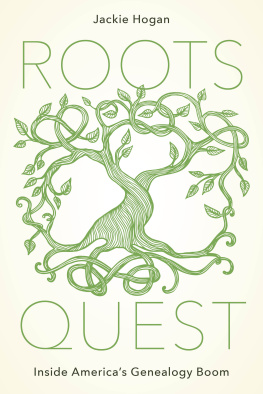
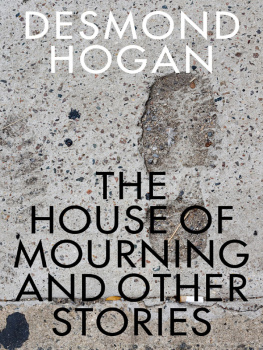




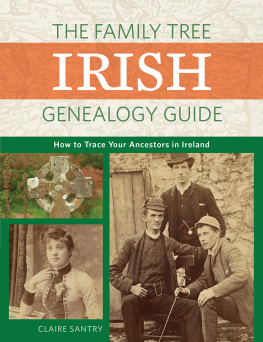
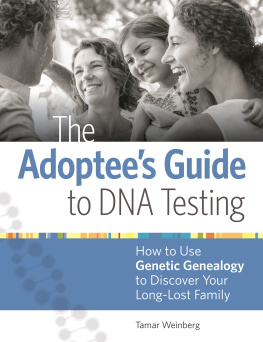

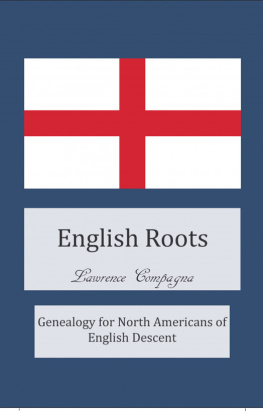
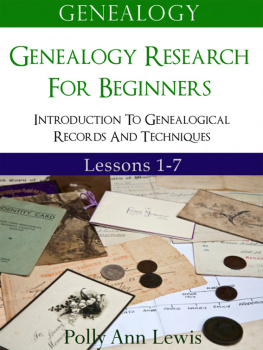
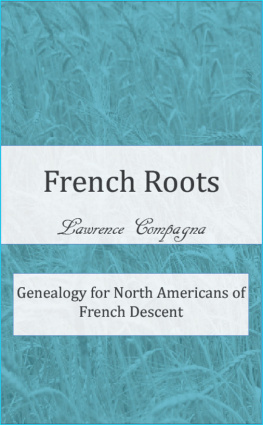

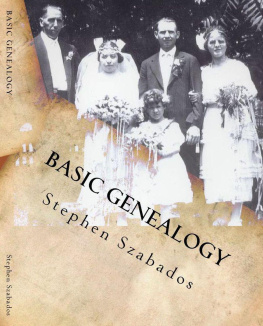
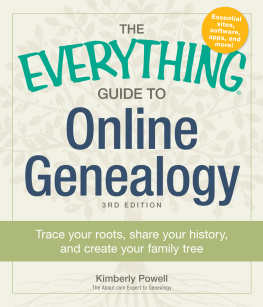

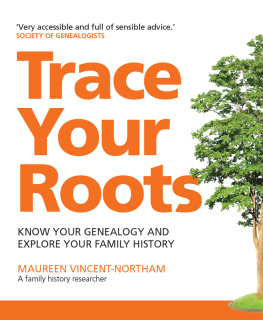
 The paper used in this publication meets the minimum requirements of American National Standard for Information SciencesPermanence of Paper for Printed Library Materials, ANSI/NISO Z39.48-1992.
The paper used in this publication meets the minimum requirements of American National Standard for Information SciencesPermanence of Paper for Printed Library Materials, ANSI/NISO Z39.48-1992.